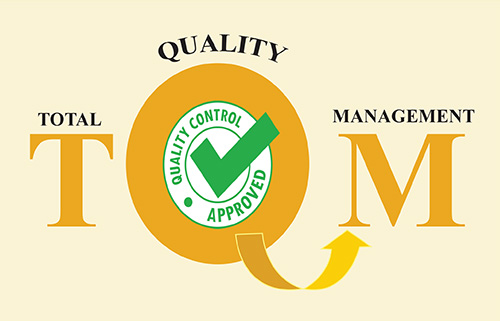Total Quality Management (TQM)

Introduce
TQM: Total Quality Management
Updating ....
Training methods
- Power Point presentation, group presentation
- Join the discussion, guide and coaching through the practice of connecting to the actual work (games, exercises)
- Watch the video clip, role playing
- Handle real situations and with reference books
- Tell the story/Sharing real experiences
- Each participants will be practicing and receiveing suggestions, editing in class
Contents
-
TQM APPROACH
- What is Total Quality Management?
- Deming's Philosophy and Management Approach
- Juran's Philosophy and Management Approach
- Crosby's Philosophy and Management Approach
- Characteristics of Successful TQM Companies
- TQM beliefs and reasons to begin now
- How several companies successfully implemented continuous improvement in their firms
-
TECHNIQUES FOR TQM IMPLEMENTATION
- The pitfalls successful TQM Companies must avoid
- Steps in implementing TQM:
- Obtain CEO (top management) Commitment
- Educate Upper-Level Management
- Create Steering Committee
- Outline the Vision Statement, Mission Statement, & Guiding Principles
- Prepare a Flow Diagram of Company Processes
- Focus on the Owner/Customer (External) & Surveys
- Consider the Employee as an Internal Owner/customer
- Provide a Quality Training Program
- Establish Quality Improvement Teams (QCC – Quality Control Circle)
- Implement Process Improvements
- Use the Tools of TQM
- Know the Benefits of TQM
- - The cost of quality
- - Cost-Categories for unacceptable work
- - The high cost of poor quality
- - Four types of quality cost
-
INTRODUCTION ABOUT TOOLS OF TQM
- Activity network diagram
- Affinity diagram
- Benchmarking
- Brainstorming
- Checksheets
- Control charts: statistical process control (SPC)
- Cost-Benefit analysis
- Cost of quality analysis
- Cause-and-effect diagrams
- Customer surveys
- Dot plot
- Employee surveys
- Fishbone diagram
- Flowcharts
- Focus group interviews
- Force field analysis
- Histograms
- Is/Is-Not analysis
- Interrelationship Diagram
- Interviews: Employee, Customer, Stakeholder
- Matrix diagram
- Motivating technique
- Nominal group technique
- Operational definitions
- Pareto charts
- Pie chart
- Plus - Delta
- Prioritization matrices
- Process capability analysis
- Process decision program chart
- Productivity charting
- Quality function deployment
- Regression analysis
- Root-cause evaluation matrix
- Run chart
- Sampling
- Scatter diagrams
- Solution-selection matrix
- Stakeholder surveys
- Stratification
- Time plots
- Tree diagram
- Value engineering
Duration
3 days